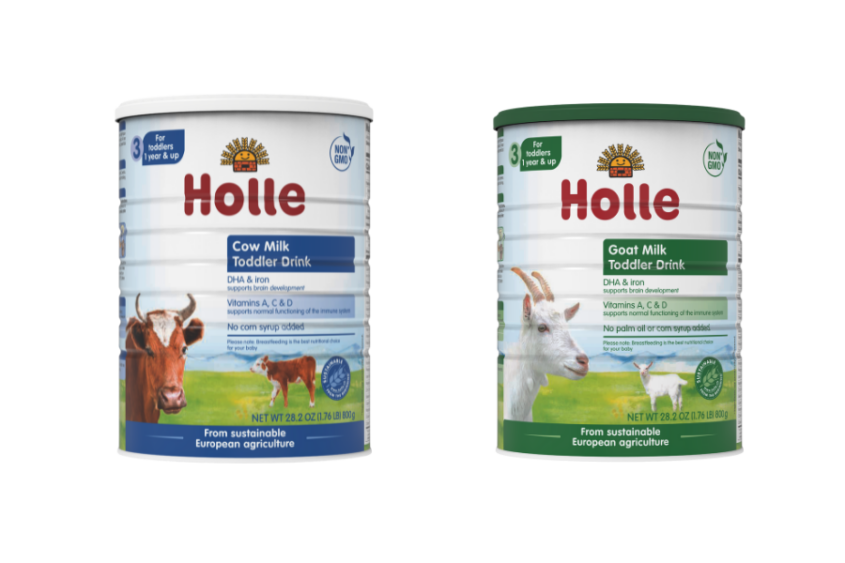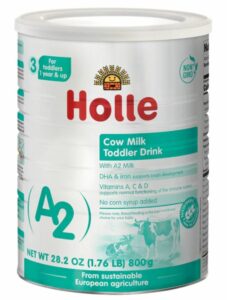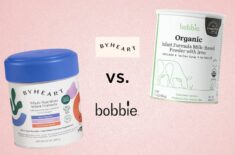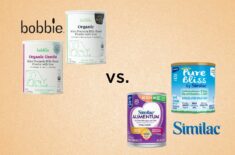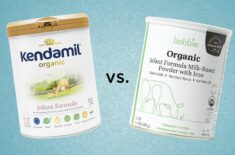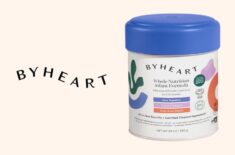Overview
Holle produces organic baby foods and formulas with ingredients sourced from Demeter-certified biodynamic farms in different parts of Europe. The Demeter certification is given to organic farms that also follow high standards for animal welfare. (1)
Are European Formulas Better?
More than 50 different American formulas are available for babies in the US. Yet, a growing number of parents are choosing European brands such as HiPP and Holle. (2)
Many parents perceive organic European baby formulas as a better choice because of the belief that European standards are stricter than the FDA’s requirements. (2)
Some parents prefer these European formulas because they are sourced from grass-fed, pasture-raised cows or goats. Although there are plenty of American organic formulas, only a handful (such as Serenity Kids Toddler Formula, Bobbie, and Enfamil Premium A2) have this feature. (2)
But can Holle baby formulas live up to your expectations? Can these products meet your baby’s nutritional needs? What options are available, and are they worth your money? Continue reading to find out.
Products by Holle: What Is The Healthiest Formula Milk?
These are the baby formulas that Holle offers:
- Holle Organic (Bio), Stages PRE to 4
- Holle Cow Milk Toddler Drink, Stage 3
- Holle A2 Cow Milk Toddler Drink, Stages 1 to 4
- Holle Goat Organic, Stages 1 to 3
Aside from formula, Holle also produces baby foods, including infant rice and oatmeal cereals.
Holle Formulas: Main Similarities & Differences
Is Holle Brand Good?
Sources & Farm Practices
- All products come from Demeter-certified organic, biodynamic farming sources.
- All products are free from GMOs. GMOs (genetically modified organisms) may provide farmers with more yield, but they can have a negative impact on consumers’ health. They can cause allergies, lead to autoimmunity, and affect the reproductive and endocrine systems. (3)(4)(5)
California-based pediatrician Michelle Perro recommends non-GMO, organic formulas. She explains that GMOs may be linked to the higher rate of childhood disorders, such as autoimmunity, allergies, neurological disorders like autism and ADHD, endocrine disruption, and growth failure. (4)
Certifications
- Certified organic to EU (European Union) standards.
Other Key Features
- Holle offers both cow’s milk and goat’s milk.
- All the products contain DHA (docosahexaenoic acid) and linoleic acids. These LCP oils (long-chain polyunsaturated fatty acids) can improve your baby’s cognitive development. (6)(7)
- The brand claims to provide customers with high-quality organic infant formulas made using sustainable manufacturing practices.
- All products come in BPA-free packaging. BPA (bisphenol-A) has been used in plastic manufacturing since the 1950s. But this toxic chemical may affect children’s behavior and cause possible effects on your baby’s brain and reproductive system. (8)
Is Holle Formula Safe?
All formulas are free from:
- GMOs (genetically modified organisms)
- Gluten
- Added sugars
- Salt (sodium chloride)
- Soy
- Corn syrup
- Pesticides
- Herbicides
- Artificial or natural flavorings
- Artificial preservatives
- Artificial colors
In choosing the right Holle formula for your little one, you can follow these formula stages:
- Holle Stage 1: For babies up to six months old
- Holle Stage 2: From six months and above
- Holle Stage 3: From 10 months and above
- Holle Stage 4: For toddlers over 12 months
Holle Recall: Why Is Holle Not FDA Approved?
In August 2021, several products from Holle were recalled by Able Groupe for not meeting FDA requirements. This massive recall involved other European formula brands HiPP, Kendamil, and Lebenswert Bioland. (9)
These formulas were recalled for failing to meet the FDA’s requirements. Many have low iron content yet failed to put proper labels indicating that your child might need iron supplements if you chose these formulations. (9)
According to the recall advisory, the FDA hasn’t received premarket notifications for these European products. This is required before a formula can be legally sold in the US. (9)
The FDA requires that all baby formulas have at least 1 mg of iron per 100 calories. It’s done to help prevent iron deficiency anemia, a condition that can lead to learning, cognitive, and functional development outcomes in children. (9)
If the infant formula doesn’t meet the minimum iron standard, the FDA requires a label (in English) indicating the possible need for iron supplementation. (9)
Many products in this massive recall have less than the required iron content, yet none included the required label. (9)
The following Holle formulas were listed on the recall advisory: (9)
- Holle PRE Bio Organic Infant Milk Formula (0-6 months; Stage PRE)
- Holle Bio Organic Infant Milk Formula (0-6 months; Stage 1)
- Holle Bio Organic Follow-on Milk Formula (6+ months; Stage 2)
- Holle Goat Organic Infant Milk Formula (0-6 months; Stage 1)
- Holle Goat Organic Follow-On Infant Milk Formula (6+ months; Stage 2)
- Holle Goat Organic Toddler Formula (10+ months; Stage 3)
Even with low iron content, these Holle infant formulas may still be safe for your little one to drink.
Though the FDA advisory recommends immediate disposal of these baby formulas, you can consult with your pediatrician to confirm if these formulas can be safe for your baby. Your pediatrician may recommend iron supplements so your baby can still meet their daily iron requirements.
Note that not all of these recalled products have low iron content. The following Holle formulas meet the FDA’s iron minimum requirements:
- Holle Bio Stage 2 Organic Follow-on Milk Formula (1.18 mg)
- Holle Goat Stage 2 Organic Follow-On Infant Milk Formula (1.47 mg)
- Holle Goat Stage 3 Organic Toddler Formula (1.52 mg)
But these were still included in the recall due to the lack of premarket notifications.
For any questions and/or concerns, you can reach Able Groupe via [email protected]. (9)
According to Holle USA, after the recall, JSG Organics LLC (one of Holle’s US importers), took steps to register these products with the FDA.
Potential Allergens
- All Holle products are from dairy sources. They contain milk proteins, a potential allergen.
- Cow’s milk allergy is caused by the immune system’s overreaction to milk proteins. It may lead to allergy symptoms such as wheezing, trouble breathing, or hives. (10)
- Although cow’s milk proteins more commonly cause it, milk from other mammals such as goats, sheep, and buffalo can also trigger an allergic reaction. (10)(11)
Other Possible Cons & Disadvantages
- There aren’t any prebiotics or probiotics added to Holle formulas.
- It’s not a requirement for infant formulas. But many manufacturers add prebiotics and probiotics, which may help improve your baby’s tummy health. These can also help your baby avoid having constipation. (12)(13)
- All these three formulas contain maltodextrin and vegetable oils.
Main Differences
Holle Bio Cow’s Milk (Stage 1)
- This dairy formula is among the most value-friendly options you can buy from Holle.
- It costs $1.84 per oz. In contrast, goat milk costs $2.34 per oz, while A2 cow’s milk costs $1.97 per oz.
- It may contain more proteins, DHA, and vitamins A, E, and K.
Holle Goat Milk Formula (Bio), Stage 1
- This goat’s milk is free from palm oil, a common component in many formulas that can reduce calcium absorption. (14)
- It may contain more proteins, total fats, and calcium.
- It contains smaller milk proteins that may be easier to digest than cow’s milk proteins.
Holle A2 Cow Milk Toddler Drink, Stage 3
- It’s a formula from A2 cows whose milk contains a different type of protein from A1 cow’s milk typically used in traditional baby formulas.
- A2 milk can be a good option if your baby has lactose intolerance. (15)
- It may contain more iron, total carbohydrates, and vitamins B6, C, and D.
Learn more about each Holle formula below.
Holle Bio Cow’s Milk (Stage 1)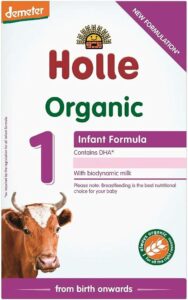
Best Features & Safety
- The brand claims that this organic baby formula contains milk protein ratios close to the milk of breastfeeding moms.
- It has DHA from fish oil, a long-chain fatty acid that can help promote your baby’s brain development. (7)
Age Range
- Zero to six months old
Ingredients Can Include
- Demeter skim milk
- Organic whey product (partly demineralized whey powder)
- Organic vegetable oils (organic rapeseed oil, organic sunflower oil, or organic palm oil)
- Organic maltodextrin
- Organic lactose
- Demeter skim milk powder
- Fish oil (source of DHA)
- Biodynamic skim milk powder
Nutritional Facts
Each serving (3.4 oz) contains:
- Calories: 281 kJ
- Total fats: 3.4 g
- Total carbohydrates: 7.7 g
- Added sugars: 0 g
- Proteins: 1.4 g
- Vitamin A: 58.9 mcg
- Vitamin B6: 0.056 mg
- Vitamin C: 14 mg
- Vitamin D:1.3 mcg
- Vitamin E: 1.7 mg
- Vitamin K: 6.3 mcg
- DHA: 19.4 g
- Omega-3 fatty acids: 52 mg
- Iron: 0.54 mg
- Calcium: 55.8 mg
This formula can also contain other nutrients:
- L-carnitine
- Zinc
- Copper
- Manganese
- Selenium
- Fluoride
- Choline
- Niacin
- Potassium
- L-Tyrosine
- Pantothenic acid
- Folic acid
- Biotin
Product Recall
- It’s among the Holle products recalled in 2021 for not meeting FDA standards. (9)
- Even if it has low iron content, this formula may still be safe for your baby.
Consult your pediatrician to verify if your baby can use this formula and if iron supplementation is necessary.
Pros
- It’s manufactured and packaged in Germany.
- It can have a stable shelf life of at least six months.
Cons
- It only contains 0.54 mg of iron per serving (0.81 mg per 100 calories), but the FDA requires at least 1 mg of iron per 100 calories of formula. So, your pediatrician might recommend iron supplements for your baby to meet their daily nutrition needs. (9)
- There’s a product recall for this formula in the US. (9)
- It has maltodextrin.
- It contains palm oil, a common formula ingredient linked to reduced calcium absorption. Regular intake of formula with palm oil can lead to decreased bone density. (14)
- It also has questionable vegetable oils, such as sunflower oil.
What Customers Say
Positive Reviews
“After a few days of switching to this formula my son became regular and had no awful gas pains. This formula is working for us.” – Reviewer on Little Bundle.
Negative Reviews
“My baby hates it, spits it up.” – Reviewer on Formula Land.
Holle Organic Goat Milk Formula (Stage 1)
Best Features & Safety
- It may be an alternative to cow’s milk because its proteins can be easier to digest.
- This formulation is made from full cream goat’s milk which contains saturated fatty acids. These are essential parts of your baby’s diet and can help improve your baby’s cognitive development. (6)
- It’s free from palm oil, which can reduce calcium absorption in your baby’s body. (14)
Age Range
- From birth to six months old
Ingredients Can Include
- Organic full cream goat’s milk powder
- Organic maltodextrin
- Organic lactose
- Organic vegetable oils (organic sunflower oil or organic rapeseed oil)
Nutritional Facts
Each serving (3.4 oz) contains:
- Calories: 284 kJ
- Total fats: 3.6 g
- Total carbohydrates: 7.5 g
- Added sugars: 0 g
- Proteins: 1.4 g
- Vitamin A: 54.1 mcg
- Vitamin B6: 0.038 mcg
- Vitamin C: 9.2 mg
- Vitamin D: 1.5 mcg
- Vitamin E: 1.3 mg
- Vitamin K: 5.1 mcg
- DHA: 13.9 mg
- Omega-3 fatty acids: 54 mg
- Omega-6 fatty acids: 510 mg
- Iron: 0.67 mg
- Calcium: 60.7 mg
This formula also contains other nutrients:
- Potassium
- Fluoride
- Manganese
- Selenium
- Magnesium
- Phosphorus
- Choline
Product Recall
- Holle’s goat milk formulas were included in the 2021 Able Groupe recall. (9)
Despite the recall, these goat milk products may still be safe for your baby. But it’s important to consult with your pediatrician to check if you can give this to your baby and if iron supplementation may be necessary.
Pros
- This milk may be a good option for babies sensitive to cow’s milk. But don’t give this milk if your child has a cow’s milk protein allergy because it can still trigger allergic reactions. Consult your pediatrician.
- It has DHA from algae, which can help improve your baby’s cognitive function. (7)
Cons
- It can cost more than the cow’s milk formula.
- It only has 0.67 mg of iron per serving (0.99 mg per 100 calories); the FDA requires at least 1 mg of iron per 100 calories of formula. But iron supplements can help your baby meet their daily iron requirements. Consult your pediatrician.
- There’s a product recall for this formula. (9)
What Customers Say
Positive Reviews
“No more eczema, constipation or diaper rash since switching to this product. I’m amazed.” – Reviewer on Little Bundle.
Negative Reviews
“This product was possibly part of the FDA recall, which luckily was issued just before we used it.” – Reviewer on Amazon.
Holle A2 Cow Milk Toddler Drink (Stage 3)
Best Features & Safety
- Milk from A2 cows contains a different type of protein from A1 cow’s milk. A2 milk may be ideal if your baby has lactose intolerance. (15)
- A2 milk is creamier and has a thicker consistency than traditional formula.
- A2 milk comes from a different breed of cows usually sourced for infant formulas.
- It contains DHA and ARA that can help improve your baby’s immune system and cognitive function. (7)
Age Range
- For toddlers one year old and up
Ingredients Can Include:
- Organic skimmed A2 milk
- Partly demineralized whey powder
- Organic vegetable oils (palm oil, sunflower oil, rapeseed oil)
- Organic corn maltodextrin
- Mortierella alpina oil (a source of ARA, arachidonic acid)
- Crypthecodinium cohnii oil (a source of DHA, docosahexaenoic acid)
Nutritional Facts
Each serving (3.4 oz) contains:
- Calories: 276 kJ
- Total fats: 3.2 g
- Total carbohydrates: 7.9 g
- Added sugars: 0 g
- Proteins: 1.3 g
- Vitamin A: 46.9 mcg
- Vitamin B6: 0.074 mcg
- Vitamin C: 15 mg
- Vitamin D: 1.6 mcg
- Vitamin E: 1.1 mg
- Vitamin K: 5.3 mcg
- DHA: 14.5 mg
- ARA: 14.5 mg
- Iron: 0.9 mg
- Calcium: 50.4 mg
This formula also contains other nutrients:
- Zinc
- Copper
- Folic acid
- Manganese
- Potassium
Product Recall
- None.
- It wasn’t included in the massive recall of European formulas, including Holle, by Able Groupe in August 2021. (9)
Pros
- It’s made from milk of A2 cows, which can be a good choice if your baby has lactose intolerance or a sensitive tummy. (15)
Cons
- It contains maltodextrin, palm oil, and highly processed vegetable oils.
What Customers Say
“I credit this German made formula with making my son healthy and strong.” – Reviewer on My Organic Company.
“My baby switched from breast milk to this formula and feels great.” – Reviewer on Organic Best Shop.
Summary & Recommendation
Holle offers different kinds of products so you can find the best formula to meet your baby’s needs and your preferences.
In finding the right formula for your little one, you can consider the following:
Choose Holle Bio Cow’s Milk (Stage 1) if:
- You’re looking for a value-friendly organic cow’s milk that can have more proteins, DHA, and vitamins A, E, and K
Choose Holle Goat Milk Formula (Stage 1) if:
- You prefer organic goat’s milk with smaller proteins that may be easier to digest than cow’s milk proteins
- You prefer a formula that’s free from palm oil, a common formula ingredient that can lead to low bone density (14)
- You prefer formula with more proteins, total fats, and calcium
- You don’t mind that it’s more expensive than the cow’s milk formulas
Holle A2 Cow Milk< Toddler Drink (Stage 3) if:
- You prefer a formula with A2 cow’s milk, which can be a good option if your baby has lactose intolerance (15)
- You prefer a formula with more iron, total carbohydrates, and vitamins B6, C, and D
But it’s still important to consult with your pediatrician before giving a new formula to your baby.
Which Formula Is Closest To Breast Milk?
Some nutrition experts, such as molecular biotechnologist and biochemist Rebecca Fett, suggest choosing formulations as close to breast milk as possible. (16)
According to Fett, these are the top ingredients that you should consider in finding the best formula for your baby because these are the main components of breast milk:
- Whey protein (instead of casein, the other type of milk protein)
- Lactose – primary carbohydrate source
- Prebiotics – insoluble fibers that can support your baby’s healthy gut microbiome (12)
- MFGM (milk fat globule membrane) – bioactive compounds that may support your baby’s brain development and improve the immune system’s response to infections (17)
But always make sure to ask for your pediatrician’s formula recommendations, especially if your baby might have lactose intolerance, milk protein allergy, or digestive issues.
REFERENCES
(1) https://www.demeter.net/certification/standard/
(2) https://www.nytimes.com/wirecutter/blog/us-parents-european-baby-formula/
(3) https://www.nongmoproject.org/gmo-facts/what-is-gmo/
(4) https://www.greenamerica.org/blog/downsides-gmo-infant-formula-we-asked-pediatrician
(5) https://pubmed.ncbi.nlm.nih.gov/18989835/
(6) https://pubmed.ncbi.nlm.nih.gov/12630150/
(7) https://pubmed.ncbi.nlm.nih.gov/29413359/
(8) https://www.mayoclinic.org/healthy-lifestyle/nutrition-and-healthy-eating/expert-answers/bpa/faq-20058331
(9) https://www.fda.gov/safety/recalls-market-withdrawals-safety-alerts/able-groupe-recalling-products-labeled-infant-formula-formulas-have-insufficient-iron-levels
(10) https://kidshealth.org/en/parents/milk-allergy.html
(11) https://www.mayoclinic.org/diseases-conditions/milk-allergy/symptoms-causes/syc-20375101
(12) https://pubmed.ncbi.nlm.nih.gov/25535999/
(13) https://www.healthychildren.org/English/ages-stages/baby/formula-feeding/Pages/Probiotics-in-Infant-Formula.aspx
(14) https://pubmed.ncbi.nlm.nih.gov/16582027/
(15) https://www.ncbi.nlm.nih.gov/pmc/articles/PMC4818854/
(16) https://brainhealthfrombirth.com/formula/
(17) https://pubmed.ncbi.nlm.nih.gov/27234413/


